
The economy of Botswana is currently one of the world's fastest growing economies, averaging about 5% per annum over the past decade. Growth in private sector employment averaged about 10% per annum during the first 30 years of the country's independence. After a period of stagnation at the turn of the 21st century, Botswana's economy registered strong levels of growth, with GDP growth exceeding 6-7% targets. Botswana has been praised by the African Development Bank for sustaining one of the world's longest economic booms. Economic growth since the late 1960s has been on par with some of Asia's largest economies. The government has consistently maintained budget surpluses and has extensive foreign-exchange reserves.
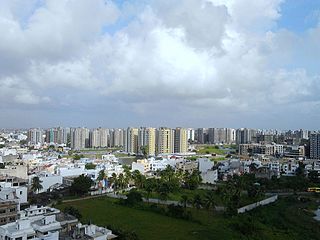
Surat is a city in the western Indian state of Gujarat. The word Surat literally means face in Gujarati and Hindi. Located on the banks of the river Tapti near its confluence with the Arabian Sea, it used to be a large seaport. It is now the commercial and economic center in South Gujarat, and one of the largest urban areas of western India. It has well-established diamond and textile industry, and is a major supply centre for apparels and accessories. About 90% of the world's diamonds supply are cut and polished in the city. It is the second largest city in Gujarat after Ahmedabad and the eighth largest city by population and ninth largest urban agglomeration in India. It is the administrative capital of the Surat district. In recent years, Surat has been in news for making a Guinness World Record for the largest gathering for a yoga session at one place where 1.53 lakh people joined the event on International Yoga Day.
Indians in Botswana do not form a very large population. As of 2016, an estimated 7,000-8,000 residents of Botswana are of Indian origin, of which 3,000-4,000 are citizens of Botswana. Most Indians are employed in the retail, manufacturing, teaching and accounting professions. Indian emigrants to Botswana primarily come from the states of Gujarat, Kerala, Andhra Pradesh, Karnataka, West Bengal and Tamil Nadu.

The bilateral relations between the Republic of India and the Republic of South Africa have grown strong since the end of apartheid in South Africa in 1994. Both countries have since developed close strategic, cultural and economic ties. Both are former British colonies and full member states of the Commonwealth of Nations as republics.

India–New Zealand relations are the interactions between India and New Zealand. Both these countries were once part of the British Empire. There are approximately 175,000 people of Indian descent in New Zealand.
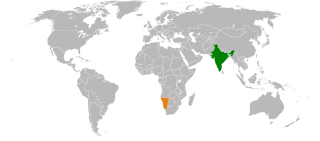
India–Namibia relations are the current and historical relations between India and Namibia. India has a high commissioner in Windhoek and Namibia has a high commissioner in New Delhi. Namibia's high commissioner is also accredited for Bangladesh, the Maldives and Sri Lanka. In 2010, relations were described by Indian officials as "warm and cordial".

India and Lesotho maintain diplomatic relations. Lesotho has a high commission in New Delhi and India has a non resident ambassador in Pretoria, South Africa. Both nations are part of the Non-Aligned Movement and the Commonwealth of Nations.

India–Rwanda relations are the foreign relations between the Republic of India and the Republic of Rwanda. India is represented in Rwanda through its High Commission in Kigali which opened on 15 August 2018. Rwanda has been operating its High Commission in New Delhi since 1999 and appointed its first resident High Commissioner in 2001.

India–Kenya relations are bilateral diplomatic relations between the Republic of India and the Republic of Kenya.

The Indian Diamond Institute (IDI) is a Government of India sponsored autonomous higher school of learning in the fields of diamonds, gems and jewellery in India. The Institute is located in Surat, Gujarat, India and is 263 km away from Mumbai. Indian Diamond Institute is an Authorised Assayer of Department of Customs, Government of India.
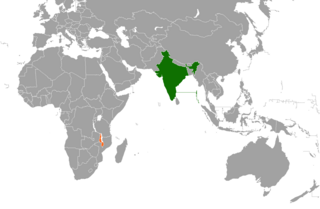
India–Malawi relations refers to the international relations that exist between India and Malawi.
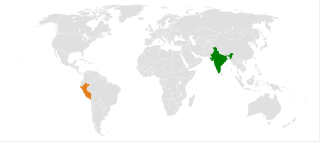
India–Peru relations are the international relations that exist between India and Peru.

India and Togo maintain diplomatic relations. Togo opened its embassy in New Delhi in October 2010. The High Commission of India in Accra, Ghana is concurrently accredited to Togo. India also maintains an Honorary Consulate General in Lomé.

Burkina Faso–India relations refers to the international relations that exist between Burkina Faso and India. Burkina Faso maintains an embassy in New Delhi. India maintained an embassy in Ouagadougou from November 1996 until its closure in July 2002. Currently, India maintains an honorary consulate in Ouagadougou, which functions under the jurisdiction of the High Commission of India in Accra, Ghana.

India–Sierra Leone relations refers to the international relations that exist between India and Sierra Leone. India maintains a High Commission in Freetown. Sierra Leone does not have a resident diplomatic mission in India. The Sierra Leonean embassy in Abu Dhabi, United Arab Emirates is accredited to India.
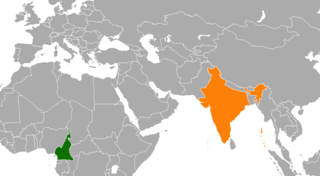
Cameroon–India relations refers to the international relations that exist between Cameroon and India. The High Commission of India in Abuja, Nigeria is concurrently accredited to Cameroon. India also maintains an Honorary Consulate in Douala. Cameroon has no diplomatic mission in India.

Chad–India relations refers to the bilateral relations between Chad and India. The High Commission of India in Abuja, Nigeria is concurrently accredited to Chad. India also maintains an Honorary Consulate in N'Djamena. In 2019, Chad opened a resident embassy in New Delhi.
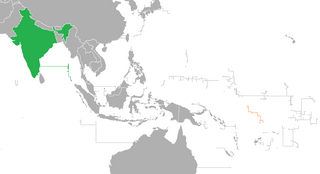
India–Tuvalu relations are the international relations that exist between India and Tuvalu. The High Commission of India in Suva, Fiji is concurrently accredited to Tuvalu. Tuvalu maintains an Honorary Consulate General in New Delhi.
India Africa Trade Council (IATC) is an Indian non-governmental trade association that provides a platform to enhance business activities between India and Africa.


















